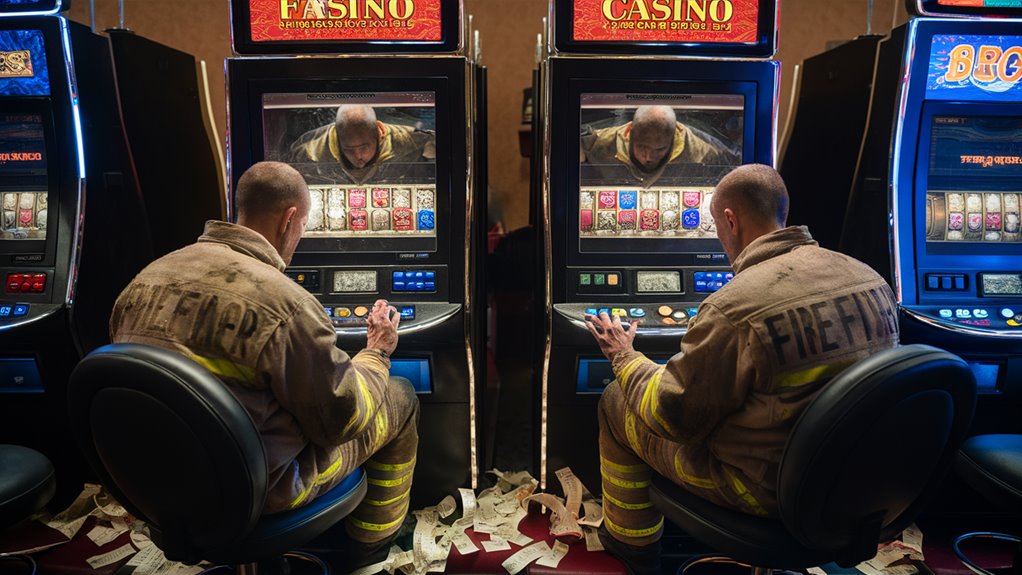트라우마 해소 수단으로 도박에 의존하는 일선 소방관들의 중독 위기
숨겨진 중독 위기: 소방관 도박 문제의 실태

문제의 범위 이해하기
소방관의 도박 중독률은 일반 인구보다 3배 이상 높아 심각한 공중 보건 위기로 부상하고 있다. 이는 구조 업무 특유의 트라우마, 불규칙한 근무 환경, 문화적 요인 등이 복합적으로 작용한 결과다.
트라우마와 중독의 연결고리
소방 현장에서의 반복적인 외상 노출과 PTSD는 도박 중독으로 이어질 수 있는 강력한 심리적 계기를 제공한다. 지속적인 스트레스는 도파민 시스템에 영향을 주며, 베팅 활동은 일시적 해소 수단으로 기능하게 된다.
소방 직군의 중독 취약 요인
- 24시간 교대근무와 비상 사이의 긴 공백 시간
- 모바일 도박 플랫폼의 손쉬운 접근성
- 감정을 드러내지 않는 조직 문화
- 고위험 구조 상황에서의 지속적 긴장감
- 지자체별 보상 체계로 인한 재정적 불균형
악순환을 끊기 위한 대응책
도박 중독과 트라우마를 동시에 다루는 전문 치료 프로그램이 운영되고 있으며, 다음과 같은 지원을 제공한다:
- 트라우마 기반 상담
- 동료 중심 회복 네트워크
- 재정 관리 툴
- 스트레스 해소 전략
- 가족 대상 지원 서비스
소방 조직 내 도박 확산의 구조
응급 서비스 분야의 도박 증가 추세
소방관들은 외상 후 스트레스와 만성 스트레스를 해소하기 위한 수단으로 도박에 빠지기 쉽다. 특히 도박은 구조 활동 중의 강한 긴장감과 유사한 도파민 반응을 유도한다는 점에서 유사한 중독 경로를 형성한다.
근무 구조와 도박 접근성
소방관의 24시간 교대 근무는 도박 플랫폼 이용에 최적화된 여건을 제공한다. 특히 야간 근무 중 긴 대기 시간 동안 모바일 도박에 노출되기 쉽다.
통계 자료와 주요 위험 요인
- 일반인 대비 3배 높은 중독 발생률
- 비정형 수입 구조와 상시 초과근무
- 외상 사건 후 회피 행동
조직적 영향 및 안전 문제
도박으로 인한 재정 위기는 다음을 위협할 수 있다:
- 현장 판단력 저하
- 공공 안전에 대한 위협
- 팀워크 약화
트라우마와 행동 중독의 뇌과학
신경학적 연결 구조
생명을 위협받는 상황에 반복적으로 노출되면 뇌는 보상 경로를 재구성하게 되며, 이는 베팅과 같은 자극적 활동에 과민하게 반응하게 만든다.

스트레스 반응과 위험 추구 행동
도박은 구조 현장에서 느끼는 아드레날린 반응과 유사한 감각을 제공하며, 이는 정신적 해소 수단으로 기능할 수 있다.
만성 스트레스의 중독화 메커니즘
- 과각성 상태 지속 → 자연적 스트레스 해소 능력 소진
- 뇌의 보상 체계가 인위적 도파민 자극(도박)에 의존
치료적 접근 방향
도박 중독 치료는 중독 행동 그 자체뿐 아니라 그 기저에 있는 트라우마 반응 패턴도 함께 다뤄야 한다.
소방서 내 경고 신호
행동 징후의 초기 패턴
- 도박 관련 대화 빈도 증가
- 근무 중 스포츠 베팅 앱 확인
- 쉬는 시간 중 고액 내기 카드 게임 주최
주의해야 할 관찰 지표
- 동료에게 금전 차용
- 도박 활동에 대한 과도한 언급
- 불규칙한 근무 출근 및 결근
- 가족 행사 반복 불참
성격 및 업무 변화
- 팀 활동 회피
- 도박 관련 질문에 대한 방어적 반응
- 근무 중 과민함 또는 집중력 저하
- 도박 사실 은폐 또는 기만 행위
즉각적 개입이 필요한 신호
- 전 급여 도박에 사용
- 손실 추적 행동
- 우울, 절망감 발언
- 음주 증가 및 우울 증상
재정적 파급 효과
경제적 붕괴 위험
소방관 도박 중독은 다음과 같은 재정 피해로 이어진다:
- 퇴직연금 인출
- 신용카드 한도 초과
- 고금리 대출 반복
- 주택 담보 재융자 또는 압류 위기
직업 특성에 따른 취약성
정기적인 급여와 수당 구조는 도박 자금 유입을 지속적으로 가능하게 하며, 다음과 같은 고위험 결정을 유도할 수 있다:
- 직장 내 동료 차용
- 응급 자금 고갈
- 직업 윤리 침해 위험
직무 및 경력 영향
- 현장 집중력 저하
- 연금 손실 또는 징계 가능성
- 의사결정 능력 저하
회복 비용 부담
다수의 소방 기관은 직원 지원 프로그램(EAP)을 운영하지만, 종합적인 중독 치료에는 추가 비용이 발생한다:
- 전문 상담
- 입원 또는 외래 중독 치료
- 재정 상담 서비스
- 장기 정신 건강 지원
침묵의 고리 깨기
은폐된 고통
소방관은 도박 중독 문제를 공개하는 데 주저하며, 이는 생명 구조 책임과 동료 신뢰 상실에 대한 두려움 때문이다.
응급 서비스 문화 장벽
정서적 자립과 강인함을 강조하는 문화는 정신 건강 문제를 드러내기 어렵게 만든다. 도박은 겉으로 드러나지 않는 중독 수단으로, 감정 회피 수단으로 받아들여진다.
회복을 위한 장애 제거
- 직원 지원 프로그램 (EAP)
- 비밀 보장된 동료 지원 네트워크
- 전문 상담 센터 연계
- 소방직군 특화 치료 프로그램
전문적 비판 없는 지원
응급 서비스 분야 전문 상담가는 다음을 제공한다:
- 트라우마 기반 도박 치료
- 비공개 평가 시스템
- 경력 보호 중심의 지원 모델
- 근거 기반 회복 프로그램
소방관을 위한 회복 자원 안내
소방직군 특화 프로그램
소방관의 직무 환경을 반영한 중독 회복 프로그램은 트라우마-중독 연계성에 집중한다.
동료 지원 네트워크
- 회복 중인 소방관의 멘토링
- 문화적 이해를 바탕으로 한 비판 없는 조언
전문 치료 센터
국제 소방조합(IAFF) 산하 Center of Excellence 제공:
- 중독 및 PTSD 통합 치료
- 교대근무에 맞춘 프로그램
- 소속 기관과 연계된 회복 계획
기밀 자원 및 국가 서비스
- 국가 도박 문제 헬프라인: 1-800-522-4700
- 응급직군 전문 상담가 연결
- 24시간 위기 대응
법적 보호 및 복직 권리
- 치료 중 기밀 보장
- 회복 기간 중 고용 유지
- FMLA에 따른 의료 휴직 보장
응급직군 회복 트랙 구성
- 도박 중독 + 외상 회복 병행
- 현업 친화적 일정 조정
- 동료 통합 기반 프로그램 설계


